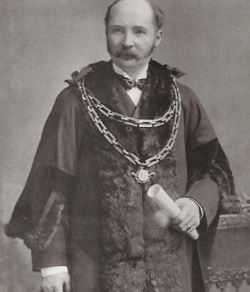Henry Burridge
Mayor of Bedford 1900 & 1904

Henry Burridge was born in Bedford on 3rd December 1856 and was educated at Riley’s School. After leaving school he worked in the building trade, and went into partnership with his brother Alfred, building houses in Chaucer Road, Lansdowne Road, Milton Road and elsewhere. Later he set a trend in the town of converting large houses into separate flats. When the Bedford Corporation sold off Mr Nash’s house in St Mary’s Street from its grounds (which were converted into St Mary’s Gardens) the Burridge brothers bought it and converted it into the Bridge Hotel.
In the 1890s Henry Burridge bought the Elstow Hardwick Brickworks in Ampthill Road and began to develop estates for building purposes. He bought Cauldwell House and adjoining fields, making the house his home and building Whitbread Avenue, Stafford Road and Granville Street on the fields. He also set up a steamboat ferry between the river meadows and Queens Park. He also went into partnership with the Reverend W E Beckett in the Fairfield Brickworks on Clapham Road, but ended the partnership after a law suit.
Henry Burridge served as a member of the Bedford Town Council for thirty years from 1888 and was Mayor twice, in 1900 and 1904. He was also a member of the County Council for 34 years, and was appointed a Justice of the Peace in 1906. In 1918 he stood as an independent candidate in the parliamentary election but lost to the sitting M.P., Mr. F G Kellaway. In his early days on the Town Council he was involved in the establishment of the Cauldwell Recreation Ground, and he served as the first Chairman of the town’s Sanitary Committee.
During his first year as Mayor a thorough overhaul of the Council’s financial system took place. A Ratepayer’s Association was formed which won six seats on the Council in November 1901 who were able to instigate many local reforms; however they became embroiled in a dispute with Henry Burridge over the town’s water supply which largely ended the influence of the reformers on the Council by the end of 1903.
In 1876 Henry Burridge married Miss Pearcy Elson of Finedon in 1876 and they had five children, four sons and a daughter. The early 1920s were marked by tragedy: his eldest son Walter died in October 1920, his youngest son Cecil died in February 1921, followed by his wife in April 1921. Two years before his death Henry Burridge suffered a seizure from which he recovered sufficiently to resume most of his public duties. He died at his home, Cauldwell House in Kempston Road, in July 1932.